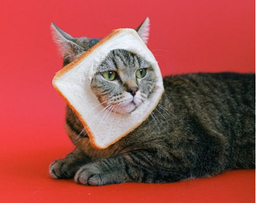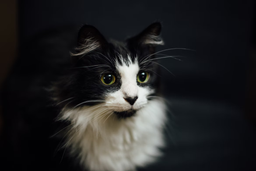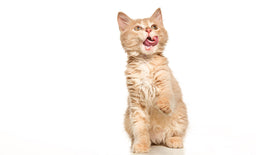Untamed’s guide on how much to feed a kitten to guarantee mischief
There is nothing quite like having a kitten in the house.
The constant playfulness, the desire to be near you all the time, the first steps in exploring new surroundings, and the tumbles that are so common—all of these make the experience of raising a kitten unforgettable.
You have a huge responsibility, though—as the kitty’s new parent, you have to plan their diet and make sure they get all the nutrients they need to grow.
How much is enough? Untamed has the advice you need on how much to feed a kitten—get all the kitten facts you need!

“Go on, jump, I dare you” (Photo credit: Helena Lopes. Image source: Pexels)
What do cats eat?
Cats are out-and-out carnivores.
Around three million years of evolution have given them short digestive systems that can cope with meat, excellent eyesight, second-to-none balance, and agility that we can only marvel at.
From the earliest age, kittens need:
- Animal protein
- Animal fats
- Small amounts of carbs to help digestion
Initially, they will get these from mummy’s milk. After four to six weeks, mummy will call last orders and start to wean her kitty off milk and onto solid food.
This is usually where your work begins.
Your kitten needs a huge amount of energy in the first six months of life—they are going to grow from around 500 grams to three kilograms or more within the first 12 months of their life. This means their weight should progress roughly as follows:
|
Kitten’s age |
Approximate weight |
|
Newborn |
100 grams |
|
Two to three weeks |
170–225 grams |
|
Four to five weeks |
225–450 grams |
|
Eight weeks |
680–900 grams |
|
12 weeks |
1.2–1.5 kilograms |
|
16 weeks |
2–4 kilograms |
|
18 weeks up to 12 months |
Between 3 and 5 kilograms |
This means your furball will grow to ten times their birth size in the first ten or so weeks of their life.
That is a mammoth task.

Where’s my dinnnnnnneeeeeeeer??? (Photo credit: Danielle Daniel. Photo source: Pexels)
How much food should a kitten eat?
The answer to the question, “How much food does a kitten need?” depends on:
- Your kitten’s genes
- What food you serve
- How energetic your kitten is
Your kitten’s genes
If you are lucky, you will be able to eat what you want without piling on the pounds. The less lucky people put on weight looking at a picture of a sausage roll.
Kittens are the same—some are naturally trim and lean, while others are built more for comfort than speed.
You can’t influence a kitten’s final weight by what you feed them, but you can make sure they grow at a steady, healthy rate.
What food you serve
Depending on the quality of food you give them, a kitten will need more or less to satisfy their nutritional needs.
The better you feed a kitten, the less food they need.
If you start off with lower-quality food and transition to higher-grade nutrition, you may get worried that your kitty doesn’t seem to be eating enough.
There is generally no cause for alarm, as the best kitten foods are designed to be energy-dense, delivering a large number of calories in a package suited to your kitten’s tummy size.
You and your kitty will quickly learn how much food they need to fuel their mischief-making.
How energetic your kitten is
Kitten feeding guidelines are based on averages and take no account of the amount of time your kitten spends climbing the wall after a dancing spot of red light or disembowelling your favourite jumper.
Some kittens were Duracell bunnies in previous lives, while others were more likely closet sloths.
The “correct” feeding amount depends on how much energy your kitten expends. You might not get it right immediately, as the process is one of trial and error.
Don’t be worried, though, if they’re not hungry for one mealtime—it may be that they have eaten enough to give themselves the energy they need to replenish for the moment.
Is there a feeding chart to help me?
For an average kitten, these guidelines should give you an indication of how much food they need.
The feeding amounts are based on the assumptions that:
- Your kitten is eating solid food
- The food is high-quality, using animal proteins and fats
- Your kitten is healthy, with no digestive problems or food sensitivities
Our guidelines are based on kilocalories as each food is different—whichever you choose will suggest the amount of food this calorie need equates to in grams.
The calories the average kitten needs are as follows:
|
Kitten weight |
How many calories are needed per day |
|
100 grams |
31 kcal |
|
200 grams |
52 kcal |
|
300 grams |
88 kcal |
|
400 grams |
104 kcal |
|
900 grams |
162 kcal |
|
1.4 kilograms |
225 kcal |
|
1.8 kilograms |
272 kcal |
|
2.3 kilograms |
327 kcal |
|
2.7 kilograms |
369 kcal |
|
3.2 kilograms |
419 kcal |
|
3.6 kilograms |
457 kcal |
|
4.1 kilograms |
504 kcal |
|
4.5 kilograms |
541 kcal |
Up to the one-kilogram mark, your kitten needs vast amounts of energy every day. As they get older and bigger, the daily requirement gradually diminishes compared to their body weight.
How often do you feed a kitten?
With all the growing, playing, learning, and exploring your floof has to get up to, mealtimes need to be regular occurrences.
A kitten’s stomach is tiny—about the size of a walnut at ten weeks—so they can’t take much food onboard at a sitting. You will learn how much is enough for each meal over time, but the rule of thumb should be “little and often.”
You should aim for the following number of feeding times per day:
|
Kitten age |
Number of meals per day |
|
Birth |
Six |
|
Two weeks |
Four |
|
Three weeks |
Three |
|
Eight weeks |
Two to three |
|
Ten weeks onwards |
Two |
What should I feed my kitten?

Lookin’ good, feline good!
Image (c) Untamed
After weaning, your kitten will become increasingly dependent on you to give them what they need to grow into a full-blown lounge tiger.
Once mummy starts calling time at the milk bar, you take over making sure their food gives them everything they need to grow healthily.
Their bodily functions are developing at an incredible pace, and your choice of nutrition needs to take account of what’s happening in their various growth phases:
|
Kitten age |
What is developing? |
What kind of food is right? |
|
Birth to four weeks |
|
Mummy’s milk |
|
Four to six weeks |
|
Mummy’s milk and occasional portions of kitten porridge |
|
Six to eight weeks |
|
Kitten porridge with occasional returns to mummy |
|
Two to four months |
|
Gradual transition from kitten porridge to solid kitten food. Mummy will start refusing to suckle |
|
Over four months |
|
Solid kitten food |
The most important phases are:
- Six to eight weeks
- Two to four months
Six to eight weeks
This phase is often called the “immunity gap,” during which mummy’s milk can no longer provide the immune support her kitty needs, but vaccines won’t be effective yet because mummy is still providing antibodies.
Your food in this phase should be formulated to help your kitten fight off any infections that they may pick up.
Two to four months
The two-to-four-month phase is the big growth phase in which your kitten’s body prepares itself for adulthood.
The food in this phase needs to be protein- and energy-rich to make sure the kitten’s muscles can develop at the correct pace.
Bearing in mind that kittens should quadruple their weight in these two months, your choice of food is absolutely crucial in managing their growth—the weight should be piled on, but not at the expense of bone malformations or fatty tissue being added.
What makes good quality kitten food?
Your kitten is a carnivore from birth and needs the nutrients that only a meat-based diet can give them.
So what do kittens need to eat? Feeding your kitten properly means giving them:
- Protein
- Fat
- Fibre
- Vitamins
- Minerals
Protein
Protein is made up of amino acids, which a kitten needs to generate energy, build muscle, and help organs grow.
The best proteins are animal-based, and your kitten can extract more value from smaller amounts. This means you can keep the feeding amounts small while giving them everything they need. Too much food in one go—often necessary if they eat cereal-based food—can give them digestive problems.
The best sources of protein for a kitten are:
- Chicken
- Tuna
- Salmon
- Cooked fish
- Sardines
- Prawns
- Duck
- Liver
These are all easily digestible and give kittens the full range of amino acids they need in small portions.
Fat
Fat increases the palatability of any food and makes each meal delicious for cats. It facilitates several life processes and helps maintain body temperature and coat health in growing kittens. Fat is also a dense source of calories, although animal-based protein is the ideal for your little carnivore.
Kittens get the required amount of fatty acids from the fat content in whole meat. The best fat sources for your kitten are:
- Chicken fat
- Duck fat
- Fish oil
While fat is a necessary dietary nutrient, vets don’t recommend a high-fat diet for kittens, adults, or seniors, as it can lead to clogged arteries and heart disease.
Fibre
Fibres are complex carbohydrates that may help your kitten’s digestive system work well.
As well as feeding their colon with nutrients, fibre helps food pass through their intestines and come out nicely at the other end. A great sign of a healthy kitten is that their poo is firm and in small quantities.
Carbs aren’t really necessary in a kitten’s diet, though—cats don’t often eat carbs in the wild. Your kitten diet should avoid high levels of carbohydrates, and you may find you can dispense with them entirely.
Vitamins
Kittens need the full range of vitamins in their food to help their bodily systems develop, boost their immune response, and keep them alert and energetic.
Liver is a great source of vitamins A, B, D, and E, but you should be careful not to give your kitten too much as a vitamin A overdose can lead to malformation of the skeletal structure.
Minerals
Minerals are essential for the development of your kitten’s body, as follows:
- Calcium—necessary for the development of bones and teeth
- Magnesium—required to help muscles work well
- Zinc—needed to turn fats, carbs, and protein into energy
Your kitten’s food should have a high proportion of protein and a minimal amount of fat, with the ideal composition being around:
|
Kitten food ingredients |
Ideal percentage |
|
Protein |
50% or more |
|
Fat |
Up to 20% |
Whichever kitten food you choose, you need to check it carefully to make sure it has all the ingredients your kitten needs to grow up into Simba.
What kinds of kitten food are there?
Kitten food comes in a variety of mouth-watering formats, the most common of which are:
- Dry kibbles
- Wet canned food
Dry kibbles
Opinions differ on whether or not dry food is good for kittens, but even the hardiest dry food supporters agree that it should be mixed with warm water or kitten gravy for the first few months of feeding.
After about four months, you can begin to serve dry kibbles on their own, but you should always make sure water is available. A good tip is to place the water bowl at least two metres away from the kibbles. This way, your kitten:
- Doesn’t associate drinking solely with mealtimes
- Can’t mess the water up with food particles
Wet canned food
Wet canned food comes in various formats, from pâtés, to meat in jelly, to chunks of meat in gravy.
The clear advantage of wet food is that your kitty takes on a good portion of water with the food, meaning that dehydration is less of a worry.
What to watch out for in your kitten’s development
A lot of the developmental problems a kitten may experience can be helped by feeding them top-quality food from the earliest possible age.
The signs of a problem caused by nutrition are usually easy to spot, though, and you should look out for:
|
Symptom |
Possible issue |
|
Digestive problems are common in kittens. They are often caused by intestinal parasites, having eaten something that was lying around, or having an allergic reaction to something they ate |
|
|
Lethargy |
If lethargy is the only symptom, you should check whether your kitten’s food is delivering enough energy |
|
Your furball may be feeling fragile or sick, in which case they may be uninterested in food |
|
|
Noticeable weight gain or loss |
This can be a sign of an intestinal infection or parasitic invasion |
If in doubt, get your kitty to a vet to have them checked out. The sooner you act, the faster they will return to being their usual, playful self.
When your little feline companion starts turning into a mini-terrorist, it may be a good time to make sure nothing is lying around that could harm them.
Kittens are immensely curious, and you may find them trying anything left out in the kitchen. You should make sure they don’t get their teeth into:
- Onions
- Garlic
- Chocolate
- Coffee
- Tea
- Grapes
- Raisins
Any kind of raw meat, chicken, liver, eggs, or fish can contain bacteria your kitten can’t deal with yet, and milk is an almost guaranteed way to cause diarrhoea.
Get the purrfect kitten food from Untamed

This is for me, right?
Image (c) Untamed
Untamed has the ideal choice for your growing feline—you can get the highest-quality nutrition combined with a taste they’ll go wild for.
All our meals started out as home-cooked recipes, and we are still committed to:
- Human-grade meat and fish—We only use protein sources that you would use if you were cooking for your tiger-in-waiting
- Vet-formulated recipes—All our recipes have been formulated by vets, meaning you can be sure your kitten is going to get exactly what they need
- Taste, taste, and more taste—As well as being highly nutritious, your kitten will fall head-over-paws for the taste of our tailor-made meals
- High protein content—Our meals give your kitten more protein than most other foods, meaning they will have the muscles to play to their heart’s content
- Hypoallergenic—Fresh, natural ingredients without artificial preservatives or flavour enhancers make Untamed fit for sensitive kittens. We also offer the following single-protein meals for highly allergic kitties:
- Chocka Chicken in Gravy and Jelly
- Tuck-in Tuna in Gravy and Jelly
You may see the difference in a matter of days after your kitty starts eating Untamed. You should notice:
- Bundles of energy
- Healthy-looking poo in the litter tray
- Steady weight gain as your kitty grows up
- A contented, energetic, and playful demeanour
- A glossy coat and healthy skin
Don’t take our word for it—give us a try!
Every kitten we feed gets a custom-made cat food plan to make sure they’re getting the best nutrition in the right portions.
Giving Untamed a try is simple—all you have to do is:
- Take our Try Now questionnaire
- Get your kitty’s customised meal plan
- Order your starter pack
Your food parcel will arrive on your doorstep in a day. If your kitty likes our products, we will send you monthly cat food packages with no extra shipping cost. You can modify, postpone, or skip a delivery anytime—we’ll honour your request!
Your kitty can tuck into their custom meal plan, and you can be happy knowing you are giving them the best as they grow up!

Puuursonal service, direct to your door! (Image by Untamed)

![Best food for Ragdoll cats in the UK [Broken Down]](http://untamed.com/cdn/shop/articles/featured_best_food_for_ragdoll_cats_uk.jpg?v=1646818249&width=256)

